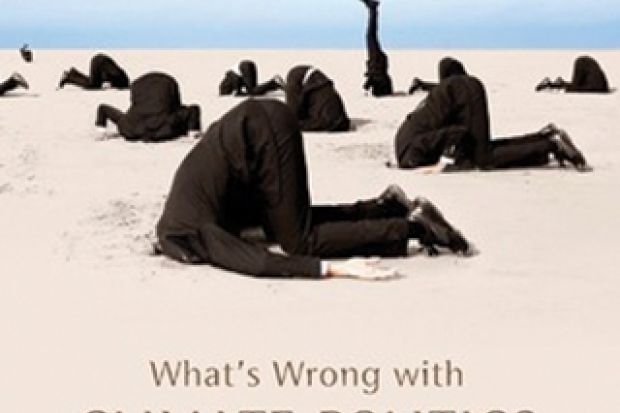According to the Bo Diddley song, “You can’t judge a book by its cover.” With this one, though, you probably can. The cover image - besuited men with their heads literally buried in the sand - encapsulates the problématique of climate change far more incisively than the melting icebergs or factory chimneys that typically front books on this most vexing of problems. Inside, Paul Harris’ penetrating insights had me vigorously nodding my head. This is not the best text I have ever read on climate change but somehow, like the cover, it struck a real chord.
Its starting point is the parlous state of climate politics. International climate negotiations are progressing at a glacial pace, if at all. This is not owing to dispute over the science but rather to a dysfunctional politics of blame that pits rich countries against poor, leading to a sterile stalemate between the two “Great Polluters”: the US and China. The upshot is ever-rising global emissions and shrinking opportunities to stabilise atmospheric greenhouse gas concentrations at something like a safe level (probably 450 parts per million; we have just hit 400ppm). What to do? No one, it seems, really knows. Neither, apparently, does Harris, who is refreshingly humble. Despite the book’s title, he doesn’t claim to “fix” climate politics but simply to address what is “most wrong” with it.
The US’ shameful game of ‘you go first’ with China, combined with its own abject failure to take action, has done immeasurable harm
The centrepiece of his argument is the need to focus on individuals, rather than nations. Instead of talking about rich and poor countries, we should be talking about rich and poor people, irrespective of where they live. By this narrative, affluent, high-consuming individuals in India or China should take as much responsibility for cutting carbon emissions as their economic peers in the West. The next step is individual lifestyle change. Affluent people everywhere must curb their high-carbon lifestyles. And apparently, leading a “simpler life” would also make us happier and more fulfilled. What’s not to like?
Harris would be hard-pressed to find a more sympathetic ear than mine, but he overplays the power of individual agency compared with the role of regulatory structures. Low-carbon choices are still typically the most expensive and least convenient. If low-impact lifestyles are to become widespread, this must be turned around so that the green choice is always the cheapest and easiest. Only governments can set the economic, regulatory and technological incentives to do so. Harris acknowledges this up to a point, but not far enough.
Returning to the international scene, the US’ shameful game of “you go first” with China, combined with its abject failure to take almost any action at home, has done immeasurable harm. There are many who still hanker after US leadership, calling for a new (inevitably weak) treaty that might coax the reluctant US “back in”. Harris instead throws down the gauntlet to China, arguing for it to assume the mantle of leadership. This is a daring, brilliant challenge that could end the stand-off between the two great polluters. The US will never lead on climate change, while the European Union has led as far as it can. We need a new, powerful player. Who better than China - the world’s largest emitter, yet also a country capable of taking bold measures, and one whose buoyant economy stands to make a packet from green technologies? Harris contends that focusing on the responsibilities of affluent individuals, rather than nations, would also appeal to the Chinese Communist Party. I don’t know about that but Harris should, given his strong expertise on China and the Asian region.
This is a rare book, which speaks from the heart while maintaining academic rigour. The only problem - and this is common in “accessible” academic writing - is the amount of repetition that has crept in. It appears that the author, or perhaps his publisher, does not expect anyone to read the whole book and so key messages are endlessly recast to ensure that they get through. The word count could have been halved - and just think of all the trees and ink that would have been saved.
So here’s a tip to the conscientious reader. If you are fed up with the repetition, skip to the inspired final sentence, which encapsulates much of what Harris is trying to say. From front cover to concluding punchline, with brilliant insights in between, this is a great book - exactly what is needed to reinvigorate a stale climate debate.
What’s Wrong with Climate Politics and How to Fix It
By Paul G. Harris
Polity, 256pp, £50.00 and £15.99
ISBN 9780745652504 and 52511
Published March 2013
Register to continue
Why register?
- Registration is free and only takes a moment
- Once registered, you can read 3 articles a month
- Sign up for our newsletter
Subscribe
Or subscribe for unlimited access to:
- Unlimited access to news, views, insights & reviews
- Digital editions
- Digital access to THE’s university and college rankings analysis
Already registered or a current subscriber?




